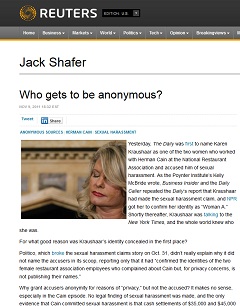Reuters, Nov. 9, 2011 Columns
 Yesterday, The Daily was first to name Karen Kraushaar as one of the two women who worked with Herman Cain at the National Restaurant Association and accused him of sexual harassment. As the Poynter Institute's Kelly McBride wrote, Business Insider and the Daily Caller repeated the Daily's report that Kraushaar had made the sexual harassment claim, and NPR got her to confirm her identity as "Woman A." Shortly thereafter, Kraushaar was talking to the New York Times, and the whole world knew who she was.--
Yesterday, The Daily was first to name Karen Kraushaar as one of the two women who worked with Herman Cain at the National Restaurant Association and accused him of sexual harassment. As the Poynter Institute's Kelly McBride wrote, Business Insider and the Daily Caller repeated the Daily's report that Kraushaar had made the sexual harassment claim, and NPR got her to confirm her identity as "Woman A." Shortly thereafter, Kraushaar was talking to the New York Times, and the whole world knew who she was.--
For what good reason was Kraushaar's identity concealed in the first place?--
Politico, which broke the sexual harassment claims story on Oct. 31, didn't really explain why it did not name the accusers in its scoop, reporting only that it had "confirmed the identities of the two female restaurant association employees who complained about Cain but, for privacy concerns, is not publishing their names.--
Why grant accusers anonymity for reasons of "privacy," but not the accused? It makes no sense, especially in the Cain episode. No legal finding of sexual harassment was made, and the only evidence that Cain committed sexual harassment is that cash settlements of $35,000 and $45,000 were reportedly paid to the two accusers. But that's no evidence at all--the cost of defending a sexual harassment charge is so steep that paying severance of $35,000 is a bargain even if a case has little merit.
Mind you, I'm not saying that the charges against Cain have no merit. I'm as open to the argument that he created a hostile environment of sexual harassment as defined by the law as I am to other interpretations of his alleged conduct (that he's fresh, that he's a masher, that he's a creep on autopilot, that he's wicked Uncle Ernie, that he's stepped out of line too many times, and that you'd rather have your daughter walk 10 miles home barefoot in the snow than to accept a ride home from him).
(Continued on Reuters.)
 Yesterday, The Daily was first to name Karen Kraushaar as one of the two women who worked with Herman Cain at the National Restaurant Association and accused him of sexual harassment. As the Poynter Institute's Kelly McBride wrote, Business Insider and the Daily Caller repeated the Daily's report that Kraushaar had made the sexual harassment claim, and NPR got her to confirm her identity as "Woman A." Shortly thereafter, Kraushaar was talking to the New York Times, and the whole world knew who she was.--
Yesterday, The Daily was first to name Karen Kraushaar as one of the two women who worked with Herman Cain at the National Restaurant Association and accused him of sexual harassment. As the Poynter Institute's Kelly McBride wrote, Business Insider and the Daily Caller repeated the Daily's report that Kraushaar had made the sexual harassment claim, and NPR got her to confirm her identity as "Woman A." Shortly thereafter, Kraushaar was talking to the New York Times, and the whole world knew who she was.--